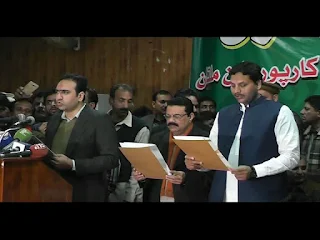The local government system was finally restored in Punjab as heads of local bodies took oath of office in their respective district headquarters on Saturday.
Multan's Municipal Corporation; mayor Ch.Naveed-ur-rehman Arain,and deputy mayors Haji Saeed Ahmed Ansari, and Munawar
Ehsan Qureshi have taken oath of their post. The newly elected mayor said while resembling Multan as Paris that city would be improved further.A graceful oath taking ceremony for newly elected local representatives was held at Raza Hall where staff has welcomed the newly elected representatives at red carpet. Rana Rizwan Qadeer ,Returning Officer took oath from the newly elected Mayor and Deputy Mayor .Besides this 91 Municipal councillors, Member of National and provincial assembly were there. Similarly, District Council Multan Chairman Makhdoom Abbas Bukhari, Vice chairman Sarfraz Khore,Syed Wajid Ali Shah,Malik Zulfikar Dogar,and Rana Shehzad Noon took oath by Deputy Election Commissioner/Returning officer Ahmed Ali Halipota.
In Chiniot, District Council Chairman Saqlain Sajanka, Municipal Committee (MC) Chairman Mehr Khalid, Bhowana MC Chairman Mohammad Arshad Mehmood, Lalian MC Chairman Mumtaz Lali and Chenab Nagar MC Chairman Hussain Abbas took oath along with their vice chairmen.District Council Sahiwal chairman , Chaudhry Zahid Iqbal.District Council Vehari chairman Ghulam Muhyudin Chishti took oath , Muhammad Husain Vehari MC chairman, Toseef Ahmed Khan Mailsi MC chairman and Ashique Arain Burewala MC chairman.
Lahore Lord Mayor Col (retd) Mubashir Javaid, along with nine deputy mayors Rao Shahab Uddin, Chaudhry Waseem Qadir, Rana Ejaz Ahmad Hafeez, Chaudhry Bilal Ahmad, Mehr Mahmood Ahmad, Haji Allah Rakha, Sawati Khan, Mushtaq Mughal and Mian Tariq took oath of their offices at the Town Hall on Saturday.
Returning Officer (RO) Mehmood Masood administered the oath to the new public representatives.
After taking oath of his office, Mayor Mubashir reiterated his determination to develop the provincial capital.
Speaking to the media, he underlined there was no tug of war for power as the new local government representatives were committed to serving people in their respective jurisdictions.
He said they would only be powerful if they were willing to serve the public. “My team, including nine deputy mayors and union council chairmen, has been chosen by the people and reached its position through grass-roots level politics.
My party has set a new example by transferring powers to local government representatives, proving it does not believe in just verbal change,” he maintained.
The mayor said his party and the new local government representatives understood public needs and would try come up to their expectations. “We also have seasoned police officers that will ensure public safety and improve law and order in the provincial capital.
Union council chairmen and councillors know their respective areas and local problems. We will work jointly to solve public problems at their doorsteps,” he said.
Highlighting his priorities, Mubashir said provision of basic facilities was the prime responsibility of local governments.
Issues related to water, sanitation, street lights, local infrastructure, basic health and education were his priorities.
The local administration gave a red carpet welcome to the representatives who reached the Town Hall along with family members, party workers and supporters.
Senior officials, including the Lahore capital city police officer (CCPO) and deputy commissioner attended the event.
The third tier of government will become functional in Punjab from Monday, January 2, 2017.
Former military ruler Pervez Musharraf installed the first local governments in all four provinces of Pakistan in 2001 after holding elections.
Direct elections on a non-party basis were held in five phases for members of union councils, union nazims, and naib union nazims in 2000 thru 2001.
On the basis of these direct elections, indirect elections were held in July-August 2001 for zila nazims and naib zila nazims and also for tehsil town nazims and naib nazims.
In order to attract people towards electoral politics, the minimum age for local government elections was lowered from 21 to 18 years and one third of the seats were reserved for women.
In 2005, local government elections were held for a second term that finished in 2010.
Both the previous and present political government showed great reluctance in continuing the local government system.
However, after a Supreme Court of Pakistan intervention, all provincial governments had to hold local government systems after a delay of nearly seven years. But this time, provincial governments have kept most of the local government functions with themselves
Tags:
National


